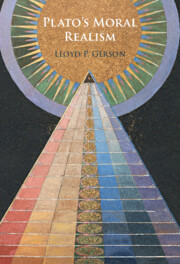
- Publisher:
- Cambridge University Press
- Online publication date:
- July 2023
- Print publication year:
- 2023
- Online ISBN:
- 9781009329934
Last updated 10th July 2024: Online ordering is currently unavailable due to technical issues. We apologise for any delays responding to customers while we resolve this. For further updates please visit our website https://www.cambridge.org/news-and-insights/technical-incident


Plato's moral realism rests on the Idea of the Good, the unhypothetical first principle of all. It is this, as Plato says, that makes just things useful and beneficial. That Plato makes the first principle of all the Idea of the Good sets his approach apart from that of virtually every other philosopher. This fact has been occluded by later Christian Platonists who tried to identify the Good with the God of scripture. But for Plato, theology, though important, is subordinate to metaphysics. For this reason, ethics is independent of theology and attached to metaphysics. This book challenges many contemporary accounts of Plato's ethics that start with the so-called Socratic paradoxes and attempt to construct a psychology of action or moral psychology that makes these paradoxes defensible. Rather, Lloyd Gerson argues that Plato at least never thought that moral realism was defensible outside of a metaphysical framework.
 Loading metrics...
Loading metrics...
* Views captured on Cambridge Core between #date#. This data will be updated every 24 hours.
Usage data cannot currently be displayed.